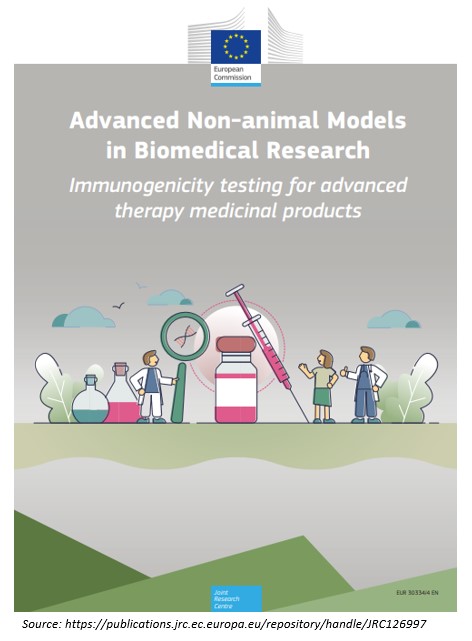Non-animal models for immunogenicity testing of Advanced Therapy Medicinal Products
The European Reference Laboratory for alternatives to animal testing (EURL ECVAM) of the Joint Research Centre has published a new technical report reviewing existing non-animal models in immunogenicity testing for Advanced Therapy Medicinal Product (ATMPs).
What are Advanced Therapy Medicinal Products (ATMPs)?
ATMPs are based on gene therapy, somatic cell therapy, tissue-engineered products, or a combination of these different classes. These innovative therapies are applied to treat pathologies resistant to conventional therapies (e.g., cancer, neurodegenerative diseases). Immunogenicity testing is an important step in the development of these therapies since it aims to predict an adverse immune response of a patient prior to receiving a particular treatment.
How was the study conducted?
Scientists from EURL ECVAM analysed 15 000 peer-reviewed publications on immunogenicity testing for ATMPs. They selected 88 peer-reviewed articles using non-animal models which were published between January 2014 and March 2019. All these 88 models are now compiled into a knowledge base containing detailed information on their use.
Which type of non-animal models are used for immunogenicity testing of ATMPs?
Among the non-animal methods used for immunogenicity testing, in vitro methods were predominant (86 out of 88), with a majority of two-dimensional in vitro models. In silico computational and mathematical modelling were poorly represented (2 out of 88 methods).
How can we improve research in this area?
- Achieve a more reliable and scalable supply of immune cells,
- Increase the number of samples that can be tested in an immunogenicity experiment and
- Implement more advanced measurement technologies such as -omics techniques to generate more information from one test.
There are thus opportunities to further exploit and implement innovative approaches and in silico tools to generate reliable and high-content data.
Who can use the knowledge base?
- Researchers to identify models and methods that can be adapted and applied to tackle their own research questions,
- Educators to provide the latest information on the state-of-the-art to their students,
- Funding bodies to consider trends, identify impactful research avenues and target promising,
- Project evaluation committees to ensure that project proposers have properly considered the use of non-animal models and methods in their research proposals,
- National Contact Points and National Committees to ensure proper knowledge sharing on non-animal methods within Member State networks and organisations involved in biomedical research using animals.
Sources:
- Canals, J. M., Romania, P., Belio-Mairal P., Nic, M., Dibusz, K., Novotny, T., Busquet, F., Rossi, F., Straccia, M., Daskalopoulos, E. P., and Gribaldo, L., Advanced Non-animal Models in Biomedical Research – Immunogenicity testing for advanced therapy medicinal products, EUR 30334/4 EN, Publications Office of the European Union, Luxembourg, 2022, ISBN 978-92-76-49091-3, doi:10.2760/7190, JRC12699
- Gribaldo, L., Dura, A., Straccia, M. and Whelan, M., Advanced Non-animal Models in Biomedical Research – Immuno-oncology – Executive Summary, EUR 30334/3 EN, Publications Office of the European Union, Luxembourg, 2021, ISBN 978-92-76- 39989-6, doi:10.2760/82873, JRC125256


